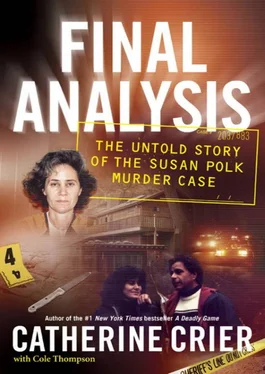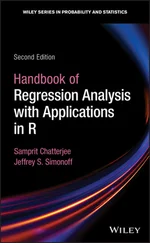Monday morning, Judge Brady made an announcement. Out of the presence of jurors, she informed the court that Susan’s expert witness had “skipped out” on the trial. “He is indicating not only is he not going to return, but he will be unavailable by telephone for this week and he will be traveling,” Brady said, referring to a three-page e-mail she received from Cooper over the weekend.
“In all my years that I’ve been doing this, I have never heard of anything like this before,” she added. “I’ve never had an expert witness take on the role of an advocate and then indicate he has chosen not to come back—that is just not an option.”
Like Judge Brady, Sequeira also expressed his shock after reading the letter that day. “I’ve never seen an expert run off like a scared rabbit before he is cross-examined.”
Cooper cited “the hostile behavior of the prosecuting attorney” as a key reason for his decision to withdraw from the case. “It was regrettable that I was unable to fulfill my designated role in the case during the week I had set aside for it,” he wrote in the letter that was made public later that afternoon. Dr. Cooper told Judge Brady that it was a “pleasure” to appear in her courtroom and assured her that his grievances were not “in any way intended to reflect unfavorably upon the Court…. I hold Mr. Sequeira completely responsible for last week’s debacle. Perhaps he has forgotten that justice isn’t always about winning.”
Cooper charged the prosecutor with crafting a “dramatic smokescreen about some discovery issues that have no bearing on the physical evidence and certainly have nothing whatsoever to do with the fact that an innocent woman is being held on false charges.” He also expressed “outrage” at the county medical examiner, Brian Peterson, accusing him of “irresponsible, unprofessional, and to my way of thinking, immoral conduct.
“Allow me to review the facts as I see them: Susan Polk is on trial for murder because Dr. Brian Peterson…saw fit to present a distortion of the autopsy evidence to the Coroner, to the District Attorney’s office, to the Grand Jury, and ultimately to the trier of fact in a murder trial.” Dr. Cooper wrote. “Not only has Mrs. Polk been indicted on false pretenses, but she has also suffered from protracted false imprisonment and estrangement from her sons as a result of Dr. Peterson’s false representations.
“I see this man to be nothing more than a public menace,” Cooper said of Peterson.
Meanwhile, Judge Brady informed jurors that morning that a “scheduling issue” had arisen, and the court would hear from Dr. Cooper at a later date. Court officials had reached the runaway pathologist by phone and, after advising him of his obligation to come back to court to finish his cross-examination, set a date of May 16 for his return.
In the meantime, Susan called her first hostile defense witness, Gabe’s foster mother, Marjorie Briner. She believed that Briner and her husband, Dan, had “brainwashed” Gabe into testifying against her. Now, she was anxious to paint the middle-school teacher as a member of a money-hungry conspiracy out to rob the Polk estate.
“I have not gained a single cent from your estate,” Briner insisted during a testy exchange. She also balked at Susan’s claim that she had turned Susan’s children against her by labeling Susan as “crazy and delusional.”
“From the very beginning, Dan and I tried to stay as neutral as possible,” Briner replied. “I tried never to use those words. Because those were words that made you very upset.”
Polk and Briner repeatedly interrupted one another, prompting the court reporter to insist they halt the cross-talk so she could transcribe all of their remarks.
“Mrs. Briner, have you ever heard of Pinocchio?” Susan asked.
Briner insisted that she had “nothing to gain” by testifying against her.
“Nothing?” Susan was incredulous. “Didn’t I put you on notice that I was going to sue you for fraud?”
Smiling, Briner acknowledged that fraud was among the threats Susan had made over the months.
“And wouldn’t a guilty verdict get you off the hook?”
During the heated examination, Susan accused Briner of perjury, in response to the schoolteacher’s claim that Susan had been verbally abusive during phone calls and in letters she sent from jail. Furious, Susan commanded Briner to sift through two mountainous stacks of letters that sat before her on the wood railing and point out an instance of “verbal abuse.”
“We haven’t even come close to the area of inquiry I’ve allowed,” Judge Brady admonished. “Move on, this is not relevant.”
“I object,” Susan shot back. “Perjury is always relevant.”
Week three of Susan’s presentation also included testimony from a former colleague of the slain therapist and a former patient who had participated in his group therapy sessions with Susan thirty years earlier. While their brief time on the stand bolstered Susan’s portrayal of Felix as a controlling husband, her monotonous questioning diluted the effectiveness of their testimony.
Psychotherapist Karen Saeger, a former colleague of Dr. Polk’s at the California Graduate School of Professional Psychology, testified to “two Felixes.” “One was tightly coiled like he could spring at you; the other was charming and charismatic,” she said. Saeger claimed that Polk had a “widespread reputation” at the college for his “taboo” relationship with his patient/wife.
Afterward, Kathy Lucia told jurors of Susan’s dependence on Felix during their group therapy sessions at his Berkeley office in the early 1970s. “He was trying to control you, I felt,” Lucia said in response to Susan’s questions.
Unlike her mother or Eli, Saeger and Lucia were two seemingly objective witnesses, who supported Susan’s claims concerning inappropriate treatment that she had suffered in Felix’s hands—especially during her young, vulnerable years. Indeed, it was on this issue that Susan should have pressed harder. At times, it appeared that she failed to realize the chord of sympathy that she could have struck with the jury had she focused on Felix’s emotional manipulation of her at a young age. Regardless of his alleged abuse, he had clearly violated professional and ethical standards in his treatment of Susan, and this behavior left his character open to question. Unfortunately, Susan found it difficult to exploit this weakness, as her evidence about Felix’s behavior often became muddled in her confused accusations of abuse and conspiracy.
By Thursday, the jury had still heard very little testimony relevant to the murder charge when Susan recalled her son Eli to the stand to refute Marjorie Briner’s testimony.
“Is she a liar?” Eli responded to his mother’s inquiry. “That’s just an understatement of her character. She is disgusting, what she’s done.”
Week four got underway with Susan’s list of witnesses interrupted once again by testimony from her “runaway” forensic pathologist, John Cooper. Dr. Cooper returned to court on May 16, and delivered portions of his case file to Judge Brady. After a review of the documents, Brady turned over in excess of fifty pages of documents to the prosecution, holding back portions she ruled to be Susan’s “work product.” Among the materials was a letter Susan sent to Dr. Cooper from jail that detailed her version of the events of October 13, 2002, and was accompanied by a rough sketch. Excerpts of that letter were read aloud in court and released to the public later that day.
Sequeira’s cross-examination of Dr. Cooper focused on the witness’s prior courtroom conduct and his contradictory conclusions regarding the County’s autopsy report. The nondescript carpet muffled the clicking of his cowboy boots as he strode to the witness box that Monday as courtroom spectators poked fun at the Hawaiian shirt beneath his dark suit and tie.
Читать дальше











